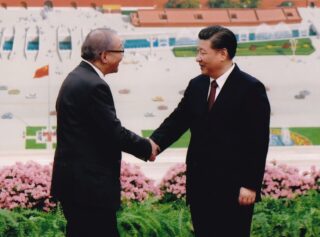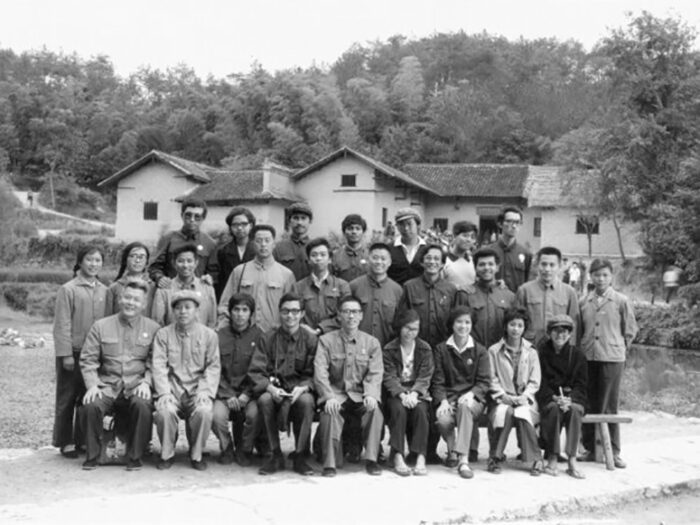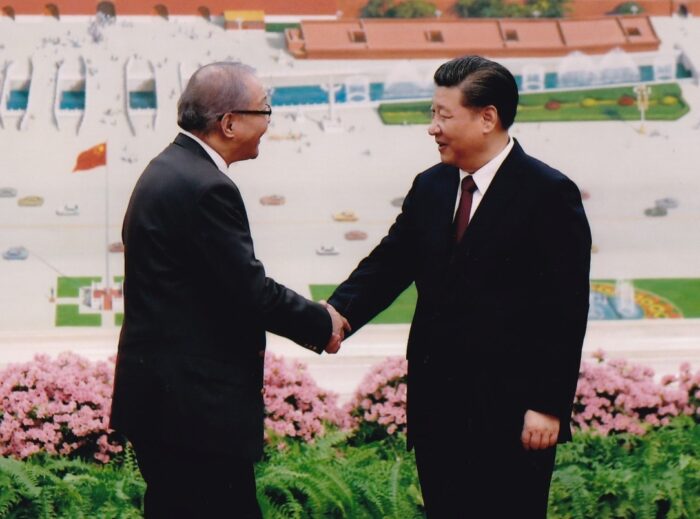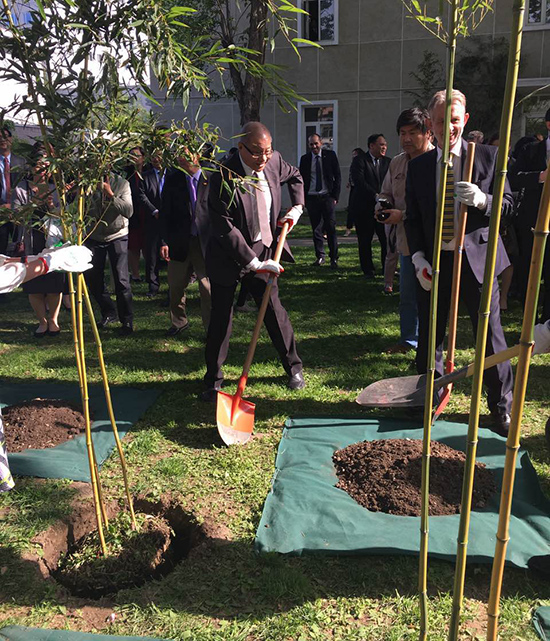2023.03.09

Conflict, Diplomacy, and the Philippine Concept of “Pakikisama”
The English language has several colorful idioms that place greater importance on actions than words. Intense negotiations in an English setting often involve one party demanding the other “put up or shut up,” that is, demonstrate the ability to deliver on said promises, otherwise, say nothing at all. To emphasize the centrality of action in negotiations, particularly in a business context, one side of the bargaining table might tell the other to, “put your money where your mouth is,” as if asserting that the cash stuffed in one’s mouth can buy the credibility that mere words cannot. Indeed, people often give little regard to the value of words. Because “talk is cheap.” But that doesn’t mean words are worthless.
It is probably safe to assume that all countries and cultures have at one point or another preferred to put up proverbial walls than talk out a dispute. Stonewalling – the willful refusal to engage in dialogue to gain an advantage in negotiations – is by no means a tactic employed exclusively by East or West. However, its use has been worryingly noticeable in the approach some Western officials have taken towards the ongoing conflict between Ukraine and Russia. The prime minister of one European country unequivocally declared, “We do not discuss. We do not negotiate,”〔1〕 to criticize another European leader who attempted to set the conditions for a negotiated settlement between the warring sides.
Considering that discussions had so far failed to stem the hostilities, the prime minister’s rejection of continued dialogue was, to an extent, understandable. But refusing to communicate implies that only retaliatory action – even violence – can settle the conflict. Words can hurt, figuratively speaking. But they can’t kill like bombs and bullets. Dispensing with dialogue only limits the options available for resolving an ongoing conflict. It encourages a continuation of fighting and an unrelenting exchange of punitive measures.
CONVERSATION AMID CONFRONTATION: A CASE FROM THE SOUTH CHINA SEA
The dispute between the Philippines and China over parts of the South China Sea has (thankfully) not deteriorated into a shooting war, but it demonstrates how two countries can stay committed to resolving their differences through diplomacy. The Philippines and China (along with other claimants) have long had competing claims over rocks and resources within the internationally important sea. During the 1990s, the diminishing American military presence in the Philippines paired with China’s rapidly increasing strength resulted in China obtaining de facto control of maritime territory from the Philippines〔2〕 until, in 2012, the Philippines challenged China before the Permanent Court of Arbitration, an international body for dispute resolution. China refused to participate in the arbitration〔3〕 and declined to recognize its 2016 ruling in favor of the Philippines.〔4〕
Almost immediately after this low point in relations, however, Chinese president Xi Jinping hosted then Philippine President Rodrigo Duterte for a state visit.〔5〕 This willingness to talk led to the formation of a Bilateral Consultation Mechanism (BCM,) a series of formal discussions to find solutions to the two countries’ issues over the South China Sea.〔6〕 Even as the Duterte administration ended and that of President Ferdinand Marcos, Jr. began in June 2022, the BCM and the Philippines’ diplomatic efforts to engage China continued. In fact, at the time of this writing, President Marcos recently wrapped up his own state visit to China. The Philippine and Chinese governments are now set to establish a direct line of communication between them to prevent the escalation of potential incidents in disputed waters.〔7〕
The state of Philippine-China relations is far from smooth, but it stands in marked contrast to the confrontational, standoffish approaches prevalent in the West today. Like all foreign ministries, the Philippine Department of Foreign Affairs (DFA) rarely ever identifies the conceptual frameworks it uses to guide its diplomacy, but its approach is reminiscent of an aspect of Philippine culture known as “pakikisama.” Loosely translated into English, it means “friendship.” However, its meaning and practice go far beyond that.
WHAT’S IN A WORD? ACTUALLY, QUITE A LOT.
“Pakikisama” entails engaging with others, thereby building a strong relationship based on shared experiences. It is such an embedded part of Philippine society that its root word, “sama,” meaning “partner” or “associate,” has over fifty variations according to one Tagalog-English dictionary. This notion of familiarity and togetherness manifests itself in daily life, business, and of course, in the Philippines’ politics and diplomacy.
Perhaps no other sentence in the Filipino language encapsulates the word’s essence better than, “Marunong siyang makisama,” which, translated roughly into English, means, “He / She knows how to get along.” In the minds of Filipinos, this sentence immediately evokes images of camaraderie and kindness. But “pakikisama” is much more than merely having a good time together, it also connotes a sense of reciprocation. It means treating each other like human beings, and bending over backwards to compromise for the sake of friendship, with no strings attached. It is not an on-and-off relationship invoked only when convenient, nor is it something that can be bought. It is something achieved by experiencing things together, overcoming shared adversities, and in so doing, earning each other’s trust.
“PAKIKISAMA” PERSONIFIED
When countries choose to stay silent, turning their backs on each other and refusing to talk, a lingering, lasting suspicion sets in. Under such circumstances, resolving differences becomes exceedingly difficult. The late Philippine Ambassador Jose Santiago “Chito” Santa Romana understood this when he was assigned to China, “the most challenging post” [in the world for a Filipino diplomat] according to the DFA.〔8〕 When he received his diplomatic appointment in 2016, Philippine-China relations were at their lowest point due to the dispute over maritime territory. And yet Amb. Sta. Romana never gave in to the anger and outrage that defined the dispute. He steadfastly embodied the very best of “pakikisama,” persistently promoting “people-to-people”〔9〕 exchanges and demonstrating that an argument, no matter how heated, need not end a friendship.
In the 1970s, China gave refuge to Sta. Romana, then a young man, student activist, and political exile.〔10〕 Decades later as ambassador, he reciprocated the kindness he received. Caught in the middle of the territorial dispute, the pressure on him to compromise nothing must have been tremendous. But he never wavered in his approach, relying on communication and dialogue to navigate the disagreements between the country of his birth and the country that once provided him sanctuary.


The Philippines and China are better off thanks to Amb. Sta. Romana’s dedication. In its tribute following his passing in 2022, the DFA declared that, “Under his distinguished tenure, Philippine-China relations flourished despite differences… and were deeply strengthened.” Even the Chinese government seemed to agree. In its own tribute, the Chinese Embassy in Manila stated that Amb. Sta. Romana, “spent the best part of his life understanding and helping the world and the Philippines to understand China,” and that the Chinese Ambassador to the Philippines, “will always be grateful for his friendship and undeniable contribution to the development of China-Philippines relations.”〔11〕
The maritime dispute between the Philippines and China still exists, but so does dialogue between the two countries. Amb. Sta. Romana’s spirit of “pakikisama” lives on.

NO ACTION WITHOUT WORDS
There is no denying that the dispute is far from resolved, and the Philippines and China continue to trade accusations of provocations as a result. Had the two countries decided to harden their positions on the dispute by simply ignoring each other, there likely would have been no dialogue between Presidents Marcos and Xi this year, no agreement to set up a hotline on the South China Sea, and none of the thirteen other bilateral agreements〔12〕 discussed during President Marcos’ state visit to China would have been signed. Logical thinking may suggest that actions have more value than words, but words lead to action. Saying nothing can be as counterproductive as doing nothing, because if two opposing sides never exchange words, it is less likely they will take the action necessary to settle their differences.
Diplomats, professional mediators, and those involved in high-stakes negotiations are aware of this. So despite strong rhetoric not to negotiate, both sides of the current Ukraine-Russia conflict have, actually, done exactly that. Direct talks between Ukrainian and Russian officials started four days after the fighting began,〔13〕 and there have been several rounds of negotiation since then. While initial discussions didn’t result in any agreements, they did pave the way for the Black Sea Grain Initiative〔14〕 that had significant implications not just for the ongoing conflict but for the entire world.
A global food crisis〔15〕 was already well underway due to the COVID-19 pandemic, and the Ukraine-Russia conflict exacerbated it by disrupting the international supply chain. This caused a sharp decrease in the supply of grain and an equally acute increase in the price of food. Food riots erupted in developing countries, while the middle and lower classes in developed countries suffered from the effects of inflation. This food crisis would have continued unabated if Ukraine and Russia (as well as mediators from Turkey and the United Nations) did not sit down to talk and come up with a workable solution. Had the belligerent sides simply snubbed each other, many millions would have starved.
Negotiations connected to the Ukraine-Russia conflict have mostly resulted in a continued impasse, highlighting an almost unimaginably vast rift that has yet to be bridged. But when breakthroughs do occur, they can have a great and positive impact. Open communication and continued dialogue sustain the hope that two conflicting sides can one day agree on a settlement that will end their fighting.
ALWAYS A CHANCE FOR COMMUNICATION
It is of course unrealistic to expect that Ukraine and Russia will declare peace anytime soon, or the Philippines and China will agree to resolve their maritime dispute before long. But whichever way the fighting in Ukraine and the stalemate in the South China Sea end, negotiations will almost certainly shape their final outcome.
Throughout history, negotiations have ultimately settled major conflicts. Naturally, the losing side has the greatest incentive to negotiate to ensure its survival and obtain whatever concession it still can. However, even the winning side has a need to negotiate. Victory has a price, and the winning side in any conflict will want to secure that victory, perhaps even add to it, without increasing the high cost it has already paid. The victorious Allies, for example, didn’t simply impose demands on the defeated Axis powers at the end of World War II. Limits to reparations, terms of occupation, and so many other points for negotiation were still discussed and agreed upon. Of course, the losing side in a war has little leverage and is almost never in a position to refuse the winning side. But if history is any indication, victories and defeats are hardly ever total and absolute, leaving room for even the slightest bit of discussion and compromise.
So no matter how deep the animosity from conflict, how resounding the potential victory, or how decisive the anticipated defeat, there will always be a need for dialogue between opposing sides. When countries come to blows and emotions run hot, violence often does the talking. If sticks and stones do indeed break people’s bones, as another English idiom goes, then words are a better alternative to the violence that hurts us.
Filipinos cherish and believe in the spirit of “pakikisama.” It is a cornerstone concept of Philippine culture that leads Filipinos away from conflict and confrontation, and more towards compromise and conciliation. It may be too late for notions like friendship and reciprocation, togetherness and kindness, to stop many of the wars raging right now. But if global society somehow starts practicing a little “pakikisama,” then maybe people will prefer to work out their problems through dialogue, instead of letting violence do the talking for them.
〔1〕Agence France-Presse, “‘Scandalous’: France’s Macron Slams Polish PM After Criticism Of Putin Talks,” NDTV.com, April 7, 2022, https://www.ndtv.com/world-news/scandalous-frances-macron-slams-polish-pm-after-criticism-of-putin-talks-2867535.
〔2〕International Crisis Group, “The Philippines’ Dilemma: How to Manage Tensions in the South China Sea,” Asia Report no. 316, (December 2021): p. 3-4.
〔3〕Ministry of Foreign Affairs of the People’s Republic of China, “Position Paper of the Government of the People’s Republic of China on the Matter of Jurisdiction in the South China Sea Arbitration Initiated by the Republic of the Philippines, Permanent Court of Arbitration,” December 7, 2014, https://www.fmprc.gov.cn/mfa_eng/wjdt_665385/2649_665393/201412/t20141207_679387.html.
〔4〕Deutsche Welle, “China to ignore international court ruling,” dw.com, July 13, 2016, https://www.dw.com/en/china-to-ignore-international-court-ruling-over-south-china-sea-rights/a-19396768
〔5〕 British Broadcasting Corporation, “Duterte in China: Xi lauds ‘milestone’ Duterte visit,” bbc.com, October 20, 2016, https://www.bbc.com/news/world-asia-37700409.
〔6〕Xinhua News Agency, “China, Philippines confirm twice-yearly bilateral consultation mechanism on South China Sea,” xinhuanet.com, May 19, 2017, http://www.xinhuanet.com//english/2017-05/19/c_136299206.htm.
〔7〕Office of the Press Secretary (Philippines,) “PBBM, Xi agree to establish ‘direct communication line’ on WPS concerns,” gov.ph, January 5, 2023, https://ops.gov.ph/news_releases/pbbm-xi-agree-to-establish-direct-communication-line-on-wps-concerns/.
〔8〕Sofia Tomacruz, “Chito Sta. Romana, Philippines’ envoy to China, dies at 74,” rappler.com, April 19, 2022, https://www.rappler.com/nation/philippine-diplomat-chito-sta-romana-dies/
〔9〕Mico A. Galang, “Understanding President Duterte’s ‘Independent Foreign Policy,’” Asia Pacific Pathways to Progress Foundation, Inc., April 17, 2017, https://www.researchgate.net/publication/322277766_Understanding_President_Duterte’s_’Independent_Foreign_Policy‘
〔10〕Jaime A. Florcruz, “Remembering Chito Sta. Romana,” The Philippine Star, April 29, 2022, https://philstarlife.com/news-and-views/134273-remembering-chito-sta-romana?page=6
〔11〕Partricia Lourdes Viray, “Chito Sta. Romana, Philippine Ambassador to China, passes away,” The Philippine Star, April 19, 2022, https://www.philstar.com/headlines/2022/04/19/2175224/chito-sta-romana-philippine-ambassador-china-passes-away
〔12〕James Relativo and Xave Gregorio, “Pacts signed with China just ‘continuation’ of past agreements, analysts say,” The Philippine Star, January 5, 2023, https://www.philstar.com/headlines/2023/01/05/2235574/pacts-signed-china-just-continuation-past-agreements-analysts-say
〔13〕Al Jazeera Media Network, “No breakthrough at Ukraine talks as Russian assault continues,” aljazeera.com, February 28, 2022, https://www.aljazeera.com/news/2022/2/28/russia-ukraine-talks-to-continue-putin-aide
〔14〕United Nations Office for the Coordination of Humanitarian Affairs, “Joint Coordination Centre opens in Istanbul to facilitate safe export of commercial foodstuffs and fertilizers from Ukrainian ports,” reliefweb.int, July 27, 2022, https://reliefweb.int/report/turkiye/joint-coordination-centre-opens-istanbul-facilitate-safe-export-commercial-foodstuffs-and-fertilizers-ukrainian-ports
〔15〕Reuters News Agency, “Food prices jump 20.7% yr/yr to hit record high in Feb, U.N. agency says,” ed. Crispian Balmer, reuters.com, March 5, 2022, https://www.reuters.com/world/food-prices-hit-record-high-february-un-agency-says-2022-03-04/
PROFILE

Jose Lacson
A student of the Doctoral Program in International Public Policy at the University of Tsukuba in Ibaraki Prefecture, Japan. He holds a BA in International Studies from Colby College, and an MA in Information Studies from the University of Tokyo. After a career as an employee, executive, and entrepreneur, he now aims to show the next generation of global leaders the value of cooperation by writing articles and teaching classes.
